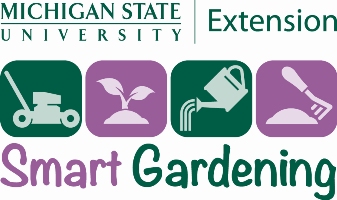
First a disclaimer: other than having gone through the Master Gardener Volunteer Program this past fall, I do not officially represent the MSU Extensions office. However, as a fledgling Master Gardener Volunteer, I am really excited about what I learned at the conference yesterday and feel it is important to share with anyone interested. Information about best practices in gardening is always changing so no matter how long one has been gardening, there is always more to learn.
What is “Smart Gardening?”
This year the extensions office has been repositioning to focus on Smart Gardening. The concept involves being informed before taking action; we can then put our knowledge of gardening to use with the least amount of negative impact on our environment. Before anyone flies into a rant about dirty hippies, know this approach to gardening is a nice compromise between having a beautiful garden/lawn, being considerate of the rest of us, and saving some $$$. If anything else, my fellow Americans should be happy about that last one.
A Few Key Concepts
We were given a ton of information at the conference spread out over the course of four presentations. The presenters included Joe Lamp’l (PBS’s ‘Joe Gardener’), Dr. Rufus Isaacs and Dr. Dave Smitley (MSU’s Department of Entomology), and Rebecca Finneran (MSU Extension Consumer Horticulture Educator). I’ll record a lot of info on this blog during the next few weeks while waiting for spring. Here are just a few key points:
Water Management
- Conserve water through the use of rain barrels.
- Prevent runoff with rain gardens, green rooftops, and dry creek beds.
- Reduce the need for watering with the use of mulch.
- Catch “warm-up” water from within the house to use in the garden.
Compost
- Reduce need for fertilizer by using compost.
- 65% of landfill items are recyclable or compostable for backyard bins.
- Reduce cost of yard waste removal by using grass clippings and leaves in the garden or compost bin.
Fertilizer & Pesticide Use
- Understand plant requirements first: Right plant; right place.
- Group plants with similar needs together.
- Only 3% of insects are harmful; why spray the whole garden?
- Plant bio-diversity to naturally attract beneficial insects / pollinators.
Smart Gardening Resources
The MSU Gardening in Michigan website is full of free literature on how to practice Smart Gardening at home. Many tips can be put into practice far beyond the Michigan growing zone. Before scalping the lawn, over-fertilizing the garden, or waging chemical warfare on possibly beneficial insects, give the site a look. In the case of a specific gardening question, Michigan residents can call the MSU Extensions Hotline at 1-888-678-3464.